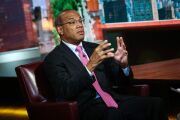Citigroup became the first Wall Street bank to agree to do a deep dive into its business to see if, and how, it contributes to racial discrimination.
The audit will be conducted by attorneys at Covington & Burling, Citigroup said Friday on its
While Citigroup’s plan follows a
“Measurement and transparency are important components of the work we are doing to advance diversity, equity and inclusion,” Edward Skyler, executive vice president at Citigroup, said in the post. “We’re demonstrating our ongoing support for measurement and transparency by committing to conduct a racial equity audit.
Citigroup investors pressed the bank during its annual shareholder meeting to conduct an audit. The lender had even gone as far as asking regulators to block the resolution; its appeal was denied. Executives then urged shareholders to vote against the proposal, arguing the firm had already enacted measures to address racial inequities, including the wealth gap. While the proposal ultimately failed, it did garner approval from about one-third of shareholders.
The audits are conducted by third-party groups that analyze companies’ business models — from policies to products and services — to determine whether they cause, reinforce or perpetuate discrimination.
BlackRock said it will perform its audit next year. Airbnb and Facebook have conducted such audits in recent years. Starbucks had also
SOC Investment Group, previously called CtW Investment Group, had
SOC also said Citigroup’s minimum fees and daily balances for checking accounts disproportionately impact people of color and inhibit their wealth creation.
“By agreeing to a third-party racial equity audit, Citi is taking a critical step toward confronting centuries-old harms against marginalized communities that are still present to this day,” Dieter Waizenegger, executive director of SOC, said in the post. “We look forward to partnering with Citi to address these concerns to pave the way for a financial industry that understands entrenched racial inequity, changes the way it conducts business and invests in the communities it serves to close the racial wealth gap.”
Citigroup has also been vocal about its desire to increase Black representation among its management ranks. The bank has said it hopes to boost the number of Black employees in the assistant vice president to managing director levels to 8% in the U.S. by the end of the year, up from 6% in 2018.
Overall, Black employees made up roughly 10% of Citigroup’s U.S. workforce in 2020. They







